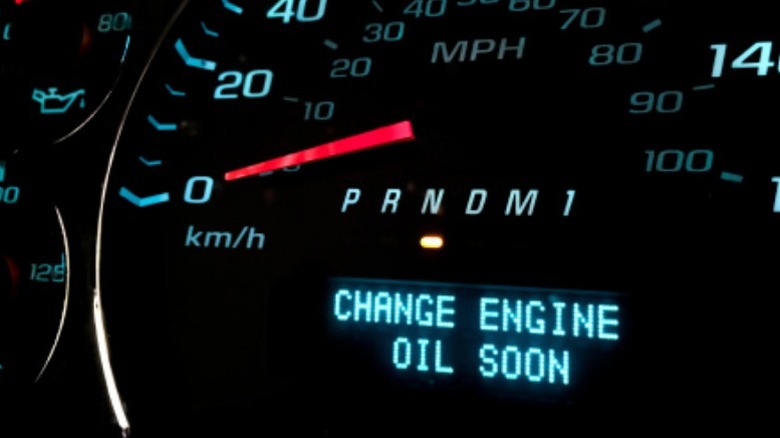Do You Need To Change Engine Oil That's Turned Black?
For vehicles that use internal combustion engines, oil is a vital component. It's responsible for lubricating the engine's internal moving parts, like the crankshaft and camshaft(s) and preventing the development of excess heat and friction. Engine oil has a violent job and as a result, it's subject to intense wear and tear and degradation over time. Because of that, you have to change your oil regularly as part of your routine auto maintenance plan. Depending on your car and its oil type, you should generally replace your oil every 3,000 to 7,500 miles. You can find your specific vehicle's oil change intervals by reading your owner's manual, contacting the dealership, or searching online.
However, besides following your vehicle manufacturer's recommended maintenance schedule, there are some other signs that it may be time to change the oil, including extremely discolored or degraded oil that has turned black. When new, oil is typically a slightly transparent amber color and looks something like dark honey. However, as it circulates through your engine, it absorbs debris and degrades, causing its color to darken. Normally, dirty engine oil is a very dark brown color. If your oil is black, though, it often means that you've gone too long in between replacements and need an oil change.
There is, however, a bit of nuance to that statement. Black engine oil doesn't always mean you need to replace it. New oil can darken very quickly, especially in older engines and in diesel vehicles. If you're interested in learning more about why oil turns black and how to know when it means it's time for a replacement and when you can ignore it, hang tight. Here's what you need to know about black engine oil.
When does black engine oil mean it's time for a replacement?
As mentioned, engine oil degrades over time, and as it degrades, its color tends to grow darker. Each time you drive your vehicle, the engine heats up to an optimal operating temperature. Then, when you reach your destination and turn the car off, the engine, and the oil it relies on, cool down. That is referred to as a heat cycle, and repeated heat cycles are one of the factors that can contribute to darkening engine oil. Additionally, modern motor oils contain various additives to help the engine function smoothly. These additives can be prone to discoloration and make the oil look darker over time. Finally, both oxidation and any debris that the oil collects as it circulates — especially if the engine is old and wasn't always maintained properly — can discolor engine oil over time.
It's also worth noting that some vehicles, like those using diesel engines, are much more likely to have black oil. This is due largely to the soot that forms as a result of the diesel combustion process, and it's relatively common for the oil in diesel cars to turn black very quickly.
So, when exactly does black engine oil mean it's time for a change? If you recently replaced your engine oil and notice that the oil on the dipstick is extremely dark or black, there's most likely nothing to worry about. However, if it's been a very long time since your last oil change and the oil is black, it's best to replace it. If you can't remember how long it's been since your last oil change, go ahead and change it. Replacing your oil is cheap, easy, and one of the most important forms of maintenance you can provide.
What are some other signs that you need to change your oil?
Besides a dark or black color, which we just learned isn't always a surefire sign that you need a change, there are some other warnings that you need to replace your oil. While, as mentioned, the best way to know when it's time to change your engine oil is to follow your manufacturer's instructions and keep track of when you performed your last replacement, it's still wise to recognize some of the other symptoms that may present when you need fresh oil.
Discolored or black oil can often mean that it's time for a replacement. However, a better sign is extremely dirty or sludgy oil. Oil in this state will be unable to flow through the engine smoothly and can lead to various performance issues and damage, like engine overheating issues, which can be another sign that you need an oil change. Low engine oil can be caused by various issues, but it can also indicate that it's time to replace the oil. Other signs that may point to an overdue oil change include dashboard warning lights, smoke coming from the exhaust, and strange engine noises or vibrations.
It's important to pay attention to any odd behavior your vehicle displays in order to avoid damage and get ahead of any issues. However, it's also worth noting that many of these symptoms can be the result of other problems besides requiring an oil change. It's vital that you remember your oil change intervals and how much time has passed between them to avoid issues such as the ones described above and keep your car healthy.


